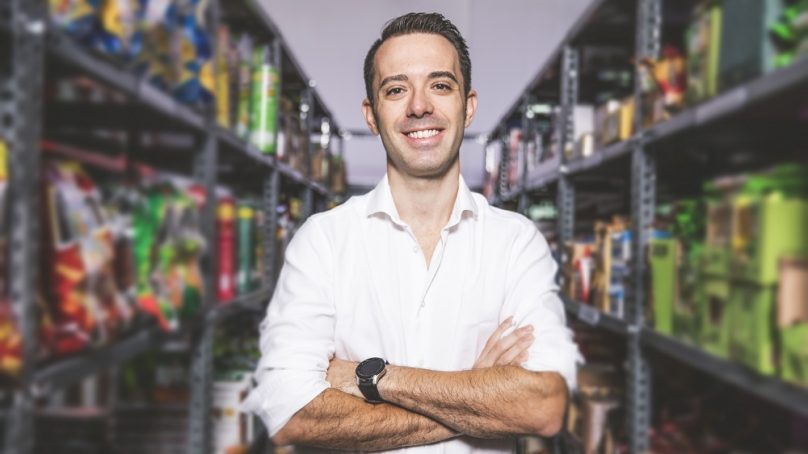
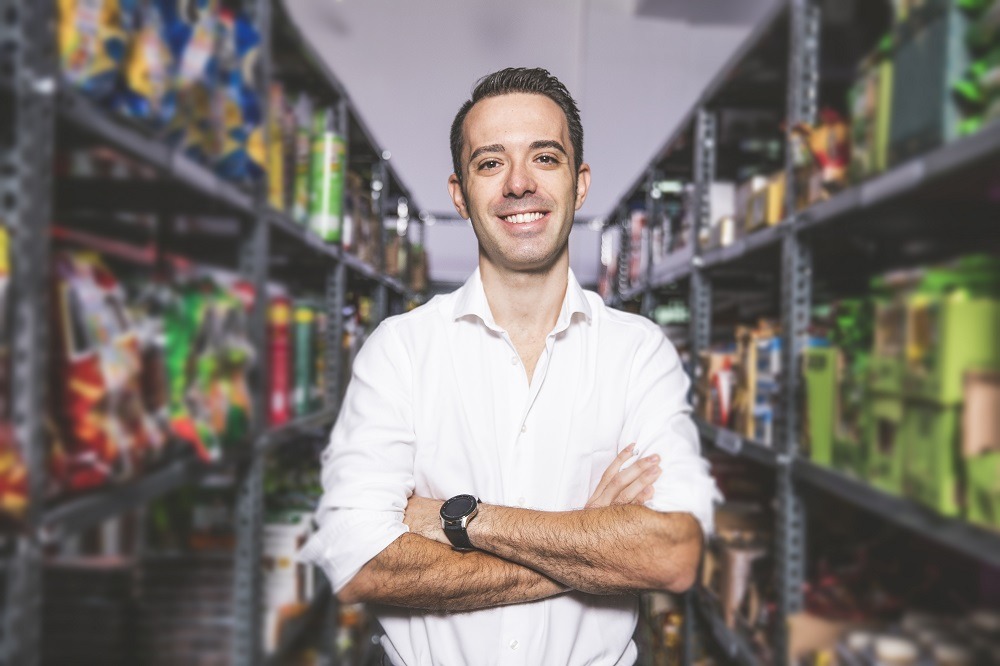 As the world is further leaning towards online food and grocery ordering, food delivery aggregators are increasingly investing in innovating in their platforms and services. HN spoke to Tomaso Rodriguez, CEO of Talabat, one of the largest online food ordering platforms in the Middle East, whose portfolio exceeds 4,000 restaurant partners, to highlight what’s going on in the industry and to know more about their growth strategy.
As the world is further leaning towards online food and grocery ordering, food delivery aggregators are increasingly investing in innovating in their platforms and services. HN spoke to Tomaso Rodriguez, CEO of Talabat, one of the largest online food ordering platforms in the Middle East, whose portfolio exceeds 4,000 restaurant partners, to highlight what’s going on in the industry and to know more about their growth strategy.
How do you assess the growth of the delivery business in the region due to COVID-19?
Our focus during the pandemic has been to ensure that our team and the community stayed safe and healthy, as well as focusing on business continuity for talabat as a company, for our riders and for our partners. There is a common misconception that food delivery boomed during lockdowns and curfews, and that Talabat exponentially benefitted from COVID-19. This simply wasn’t the case. While food delivery aggregators remained operational in some markets in the MENA, they took a hit. In other markets, where food delivery aggregators were unable to operate due to lockdowns, they took as much of a hit as other industries. The below graph shows the significant drop that the Delivery Hero network faced in the MENA region (Talabat, Otlob & Hungerstation), as opposed to other regions of the world. (Source: Delivery Hero)
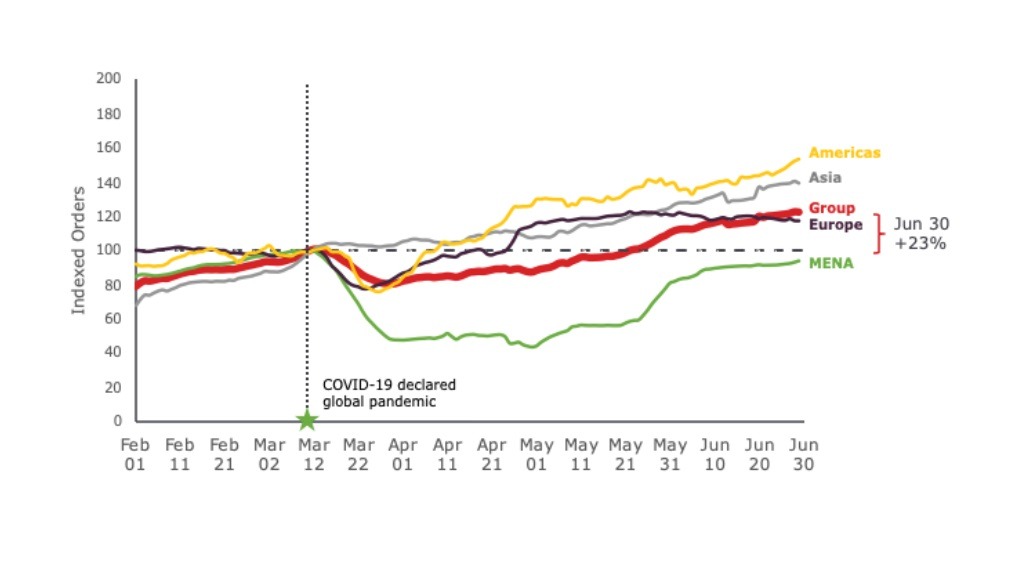
We were fortunate that our sector was operational in most markets during the pandemic, but just like most other sectors, orders decreased as there was an inherent change in consumer behavior, with our customers preferring home-cooked meals.
However, we can see orders picking up, as markets are opening up and people are settling into this ‘new normal’ and starting to get back to their office routines.
The one aspect that did exponentially grow was retail delivery, as consumers choose online shopping over store visits, either for their safety or by habit.
What are your biggest markets?
Talabat operates in eight markets throughout the MENA region, UAE, Oman, Saudi Arabia, Bahrain, Kuwait, Qatar, Jordan & Egypt. Our biggest markets are Kuwait, UAE, Egypt and Qatar. We definitely see Egypt as the market with the most potential.
How do you believe the outbreak of COVID-19 impacted your business?
As was the case for most sectors, food delivery was affected by the pandemic, however our restaurant partners experienced an even more substantial drop in orders, especially with dine-in and takeaway revenues vanishing. To do our bit to help our restaurant partners weather the uncertainty created, we implemented a number of initiatives including: free delivery, based on location – to encourage ordering customers ordering from your local, deferring commission fees, and rather than stop marketing and spending during this time, as many companies have – we actually increased our marketing spend endeavouring to drive traffic towards our restaurant partners. With many people being made redundant, or having their salaries slashed due to the pandemic, there was a need to focus on affordability – and we were able to onboard new restaurant partners to help meet this demand for different price points, as well as offer discounts to our customers. Another aspect at Talabat that we really focus on is our agility and speed. During lockdown – our ability to pivot around extensive curfews or full lockdowns in different markets helped us to open up new revenue streams. As an example, our Talabat Jordan team went above and beyond to pivot from food delivery, and set up a grocery delivery solution for the Jordanian market within the space of a weekend, during a complete lockdown. Lastly, Talabat mart has been a real game changer during the pandemic for many of our customers. Talabat mart, available in the grocery section of the talabat App is our q-commerce solution. Available in Kuwait and the UAE, it offers around the clock grocery deliveries to customers, within 30-minutes or less with no delivery charges. This means that it’s both faster, and safer, for our customers to order their groceries online, rather than go to a supermarket! During the pandemic, where we’ve seen other operators take days or weeks to deliver, speed and convenience cannot be understated, and quite simply, none of our competitors can match our speed or quality.
Unlike other businesses, we chose to invest heavily into our platform and into marketing our restaurants over cutting costs and our budgets. This has significantly helped restore consumer confidence into Talabat and secure growth for our restaurant partners facing hardships over the past few months.
In grocery delivery, Talabat mart has had very good growth in the Emirati market since the lockdown. As we widened our logistic delivery capabilities, and ensured a 30-minute, 24/7 free delivery service, we have seen very good growth, where our value propositions of speed, convenience and affordability were built on top of a strong established logistical network.
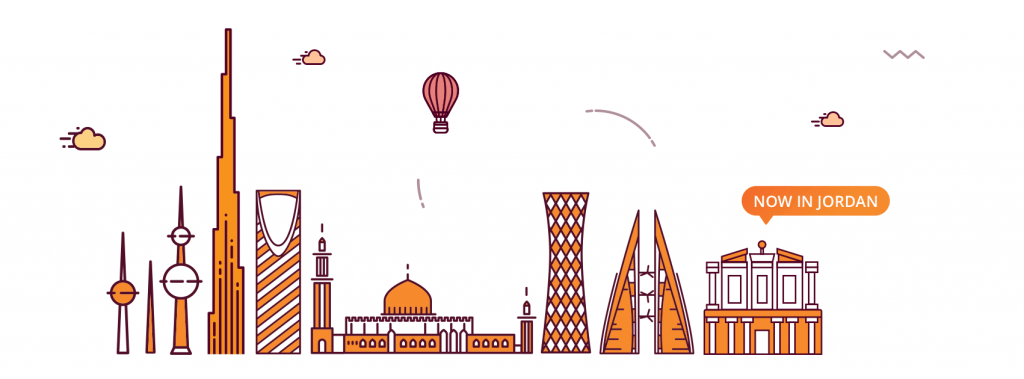 How did the pandemic enable you to give back to the community?
How did the pandemic enable you to give back to the community?
We were fortunate to be in a position to help out our local communities during COVID-19, and to help governmental entities and local authorities with their response to the pandemic. Our goal was to contribute to our communities the most we could during the crisis. Being the first to introduce now-common safety features, such as contactless delivery and the use of personal protection equipment, we continue to work with the government to achieve the most we can during COVID-19, from distributing COVID-19 prevention flyers, to facilitating the delivery of over 115,000 donated meals region-wide, as well as delivering over 23,000 medicine packages to in-need communities!
Did you introduce any new service or feature in line with the outbreak? (contact-less delivery, new payment techniques, etc)
Safety continues to be our top priority. We were first to introduce strict safety measures in our markets such as Personal Protection Equipment (PPE), Contactless Delivery, and temperature cards (which shows those preparing/delivering orders have had their temperature checked). We are proud to take up that pivotal role in helping win consumers’ trust back in the safety of food delivery. One of the features that we are most proud of is our virtual restaurants. We introduced a feature that allowed users to donate meals to those who are less fortunate through our app’s specialised virtual restaurants across some of our markets. In the UAE, this initiative was created in partnership with Dubai Culture, and we were able to donate over 50,000 meals throughout Ramadan – while we have donated over 65,000 across our other markets throughout the COVID-19 period! On the product and tech side, we introduced important innovations such as pre-ordering during Ramadan for restaurants to manage peak hours and ensure customers receive their Iftar and Suhoor meals on time. Lastly, we implemented cashless tipping – allowing our customers to tip our riders in a safe and sustainable way, in line with our COVID-19 safety measures.
 Did you notice any new stakeholders (restaurants and F&Bs) more willing to expand their delivery business today?
Did you notice any new stakeholders (restaurants and F&Bs) more willing to expand their delivery business today?
We have seen new local entrants and efforts to handle logistics, and as a business we understand why, as everyone is looking at ways to reduce running costs. Competition is a healthy thing, as it drives innovation, benefits consumers, and it pushes us to be performing at the highest level possible, adapting to the continuous change in needs of our customers. At Talabat, we continue to invest in what we believe is the best customer experience we can provide.
The constant innovation in our sector greatly benefits the consumer, and we believe that at our scale and tech, we provide the most cost efficient way for our partners to grow their businesses. This is the reason why numerous restaurants that were not delivering online signed up for Talabat during the past months.
One of the main benefits of a platform like Talabat is scalability – i.e. order volumes. We bring a lot of customers to our restaurant partners. If a restaurant has a small fleet of only a few riders, then they are limited by what they can deliver themselves. However, at Talabat, we enable our partners to fulfil high order volumes from our customers.
This is possible through professionalizing the last-mile logistics set up, being able to deliver as many orders as a restaurant can produce per hour, and making sure our riders adhere to all COVID-19 safety measures. Through the entire process, our restaurant partners can rely on us to take care of the delivery logistics of their business.
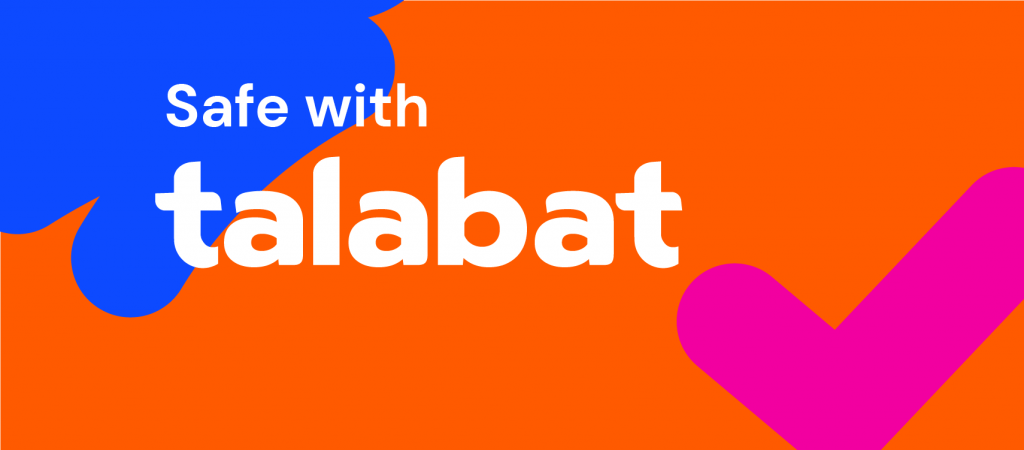 What is your advice to the F&Bs who still do not adopt a tech-advanced food delivery service?
What is your advice to the F&Bs who still do not adopt a tech-advanced food delivery service?
My advice to restaurants would be to consider their options, and understand the benefits of each different platform and operating model. At Talabat, we want to create amazing experiences for our customers and restaurant partners alike.
We want to see our restaurant partners not only get through these difficult times but to succeed and grow, and to focus on what they do best, which is preparing delicious food for our customers.
We also listen closely to feedback and are placing a renewed emphasis internally on being stronger partners to our restaurants – and to help them chart a successful path forward.
What are your expansion plans for each or your brands? Will you be withdrawing from certain markets to debut in others? Where and when?
We believe that the future will be positive for online food delivery in all markets. Throughout the COVID-19 period and beyond, we have and will be investing heavily into the growth of the platform and our customer base. This is important – as rather than compromise growth by cutting our budgets – we have chosen to invest, as when orders inevitably start to pick up, we are able to deliver and our restaurant partners reap the benefits.
We are also focusing on the expansion of Talabat mart in our different markets, as well as developing new and exciting initiatives in our current markets, for our partners’ benefit.
I can’t say too much more about that – we’ll let you know when it happens!
Add to Favorites













